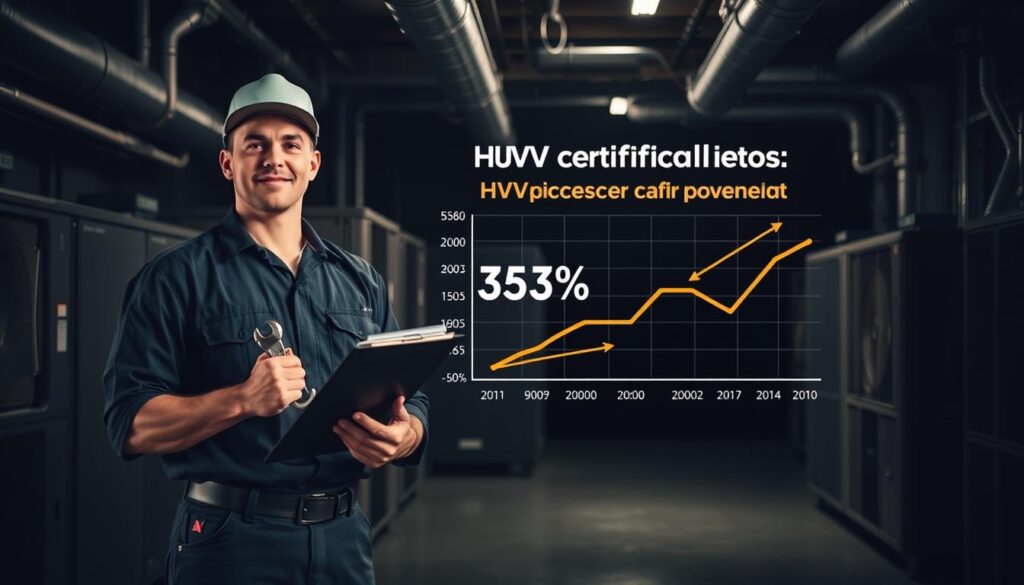Affiliate Disclosure
HVAC Guide Guys is a participant in the Amazon Services LLC Associates Program, an affiliate advertising program designed to provide a means for sites to earn advertising fees by advertising and linking to Amazon.
How Much Does HVAC Tech Make? Ever thought about becoming an HVAC technician for financial stability? What if the systems that keep our homes cozy could also ease your money worries?

HVAC technicians are key to our comfort, with a median salary of $48,730. This shows that technical skills can lead to good pay.
Exploring the HVAC tech salary starts here. This field offers many paths for growth and financial success, from beginners to experts.
Key Takeaways
- HVAC technicians earn a median annual salary of $48,730
- Salary varies based on experience, location, and specialization
- Growing demand ensures strong job market opportunities
- Certification can significantly boost earning
- Commercial and residential sectors offer different salary structures
Table of Contents
How Much Does HVAC Tech Make: National Salary Overview
Exploring hvac career earnings is key for those thinking about this trade. HVAC technicians earn a good income. This is due to their specialized skills and technical knowledge.
The income for HVAC technicians varies a lot. This makes the career exciting and offers good earning chances. Your pay can change based on your experience, where you work, and your area of expertise.
Average Annual Earnings Breakdown
Across the country, HVAC technicians make between $46,000 and $68,000 a year. Your earnings can be affected by several things:
- Where you live
- How long you’ve been working
- Any special certifications you have
- Whether you work for a company that serves businesses or homes
Hourly Wage Insights
Looking at hourly rates gives a clearer view of what you might earn:
- Entry-level technicians: $15 – $20 per hour
- Mid-career professionals: $22 – $30 per hour
- Experienced specialists: $32 – $40 per hour
The lowest 10% of HVAC technicians make about $31,000 a year. But, the top earners can make up to $80,000. Your chances of growing in this field are big, as you gain more experience and get more certifications.
Experience Levels and Salary Progression
Your earnings in the HVAC field grow as you gain more experience. Knowing how your salary increases with your skills is key to planning your career. This helps you move up in the fast-paced HVAC industry.
HVAC technicians see their salaries rise as they progress in their careers. Your pay will show your growing expertise, specialized skills, and professional certifications.
| Experience Level | Hourly Wage | Annual Salary |
|---|---|---|
| Entry/Mid-Level (0-5 years) | $22.00 | $45,760 |
| Senior (6-9 years) | $27.65 | $57,512 |
| Management (10+ years) | $32.83 | $68,286 |
Here are some ways to boost your earnings:
- Pursue advanced technical certifications
- Focus on complex HVAC systems
- Improve your customer service skills
- Keep up with new technologies
Continuous learning and professional growth are vital for a successful HVAC career and higher earnings.
Explore Our HVAC Shop
Looking for top-rated HVAC tools, parts, and accessories? Visit our shop and find the perfect solution for your needs.
Visit the ShopTop-Paying States for HVAC Technicians
Your salary as an HVAC technician can change a lot based on where you work. Some places pay much more, making where you live very important for your career.
Looking at HVAC technician salaries shows big differences around the country. Some states are better for those wanting to earn more.
Leading States with Highest HVAC Salaries
Where you live can really affect how much you earn. Here are the top states for HVAC technician salaries:
- Alaska: $75,660 annual salary
- Washington: $68,940 annual salary
- Massachusetts: $66,940 annual salary
- Connecticut: $64,610 annual salary
- Hawaii: $63,250 annual salary
Cost of Living Considerations
Even though salaries are high, it’s key to think about living costs. A higher salary doesn’t always mean you can buy more.
| State | Annual Salary | Cost of Living Index |
|---|---|---|
| Alaska | $75,660 | 127.5 |
| Washington | $68,940 | 116.3 |
| Massachusetts | $66,940 | 135.0 |
| Connecticut | $64,610 | 121.6 |
| Hawaii | $63,250 | 180.0 |
“Location can be a game-changer in your HVAC career trajectory.” – HVAC Industry Expert
Choosing where to work can greatly impact your earnings. Look into local job demand and living costs to decide on your career path.
States with Lower HVAC Salaries

Exploring hvac earnings, some states offer lower income for HVAC techs. Knowing these areas helps in making career choices and planning for growth.
Some states have lower hvac income due to economic reasons. The southeastern and mid-southern areas often have smaller salary ranges for HVAC workers.
- Arkansas: Known for lower compensation rates
- Tennessee: Limited salary growth
- West Virginia: Constrained HVAC market
- Mississippi: Reduced earning opportunities
- Kentucky: Challenging salary landscape
Florida is an interesting case, with an average salary of $46,940 and an hourly rate of $22.57. These numbers might seem low, but they don’t show the full picture of what you can earn.
Lower salaries don’t mean you can’t succeed. Skilled technicians can stand out with their expertise.
What affects lower salaries includes:
- Lower cost of living
- Reduced market demand
- Less industrial development
- Smaller population centers
Even with lower salaries, these states have their perks. They offer less competition, lower startup costs, and the chance for quick business growth. These might make up for the initial salary.
Recommendation: Research local market conditions and develop specialized skills to maximize your earning in these regions.
Commercial vs Residential HVAC Work
Exploring hvac technician salary options means understanding the differences between commercial and residential HVAC work. Each sector has unique opportunities and challenges that affect your career earnings.
The HVAC industry offers two main career paths. Each has its own benefits and earnings. Your choice greatly impacts your career and income.
Commercial Sector Advantages
Commercial HVAC work often offers higher salaries. It involves managing complex systems in:
- Large office complexes
- Shopping centers
- Industrial facilities
- Educational institutions
Technicians in commercial settings earn more due to the complexity of systems and specialized knowledge needed. The advanced technical skills required are a big part of the job.
Residential Work Dynamics
Residential HVAC work has its own set of benefits and challenges. It may be less complex but offers:
- More consistent workload
- Closer client interactions
- Potentially more predictable schedules
- Opportunities for repeat business
Your success in either sector depends on specialized skills, continuous learning, and adaptability. Both paths provide solid opportunities for a rewarding HVAC career with competitive earnings.
Explore Our HVAC Shop
Looking for top-rated HVAC tools, parts, and accessories? Visit our shop and find the perfect solution for your needs.
Visit the ShopCertification Impact on Earnings

Boosting your hvac trade income isn’t just about working harder—it’s about working smarter. Strategic certifications can make a big difference. They make you a more valuable technician in the competitive HVAC market.
The right certifications show your expertise and commitment to growth. Employers pay more for technicians with specialized knowledge and verified skills.
- EPA 608 Certification: Essential for all HVAC technicians
- NATE (North American Technician Excellence) Certifications: Validates advanced technical skills
- R-410A Certification: Specialization in modern refrigerant handling
- HVAC Excellence Certifications: Broad professional recognition
Investing in certifications can lead to higher earnings. Technicians with multiple certifications often earn 10-20% more than non-certified peers.
| Certification | Average Salary Increase | Time Investment |
|---|---|---|
| EPA 608 | 5-8% | 2-4 weeks |
| NATE Certification | 10-15% | 3-6 months |
| Advanced Specialty Certs | 15-20% | 6-12 months |
Your career in the HVAC industry grows with continuous learning. By getting certifications, you boost your skills and earnings.
Career Advancement Opportunities
Your HVAC career offers exciting paths for growth and increased pay. Skilled technicians can move from technical roles to lucrative management positions. This move significantly boosts their compensation.
Professional development in the HVAC industry involves strategic career progression. As you gain experience, many advancement opportunities emerge. These opportunities can increase your earning power.
Management Career Paths
Technicians can advance through several distinct management trajectories:
- Team Leadership Roles
- Project Management Positions
- Technical Operations Supervision
- Business Ownership
| Career Stage | Potential Salary Range | Key Responsibilities |
|---|---|---|
| Entry-Level Technician | $35,000 – $45,000 | Basic system installations |
| Senior Technician | $50,000 – $65,000 | Complex repairs, mentoring |
| Team Supervisor | $65,000 – $80,000 | Staff management, project coordination |
| Operations Manager | $80,000 – $100,000 | Strategic planning, company-wide oversight |
To maximize your pay, focus on continuous learning and getting advanced certifications. Also, develop strong leadership skills. These strategies will help you advance successfully in the HVAC industry.
Explore Our HVAC Shop
Looking for top-rated HVAC tools, parts, and accessories? Visit our shop and find the perfect solution for your needs.
Visit the ShopMarket Growth and Future Outlook
The HVAC industry is on the verge of big changes, opening up great career paths for technicians. Experts predict a bright future for hvac careers, with jobs growing faster than many other technical fields.
New trends are changing the HVAC world, making it more exciting and profitable. These include:
- More demand for energy-saving systems
- Smart home tech becoming common
- Focus on green building solutions
- New climate control technologies
Technological progress is creating new areas for HVAC experts. Those who keep learning and stay up-to-date with new tech will lead the industry.
| Industry Trend | Projected Impact |
|---|---|
| Green Technology | 15% Job Growth |
| Smart Home Integration | 20% Increased Demand |
| Energy Efficiency Specialization | 25% Salary Premium |
Climate change policies and stricter building rules will keep the demand for skilled HVAC techs high. Using these new chances well will be key to your career success.
The future of HVAC is not just about keeping things cool—it’s about making sustainable, smart spaces.
Conclusion
An HVAC technician career offers strong income chances across the United States. When looking into how much HVAC techs make, you’ll find a promising path with good pay. Experienced pros can make a lot more than other skilled trades like plumbing and electrical work.
Your earnings in the HVAC field depend on several things. Location, special certifications, years of experience, and what area you work in can change your pay a lot. HVAC techs with 10+ years of experience can make about $32.83 an hour. This is more than other trades get per hour.
The HVAC field offers more than just a salary. You can make more by specializing, getting extra certifications, or moving up to management. With more need for climate control and energy-saving tech, HVAC is a stable and profitable career for skilled people.
Thinking about your career? HVAC is a great choice. It offers good pay, steady job demand, and chances to grow professionally. This trade is appealing for those looking for a fulfilling technical career with good financial prospects.

